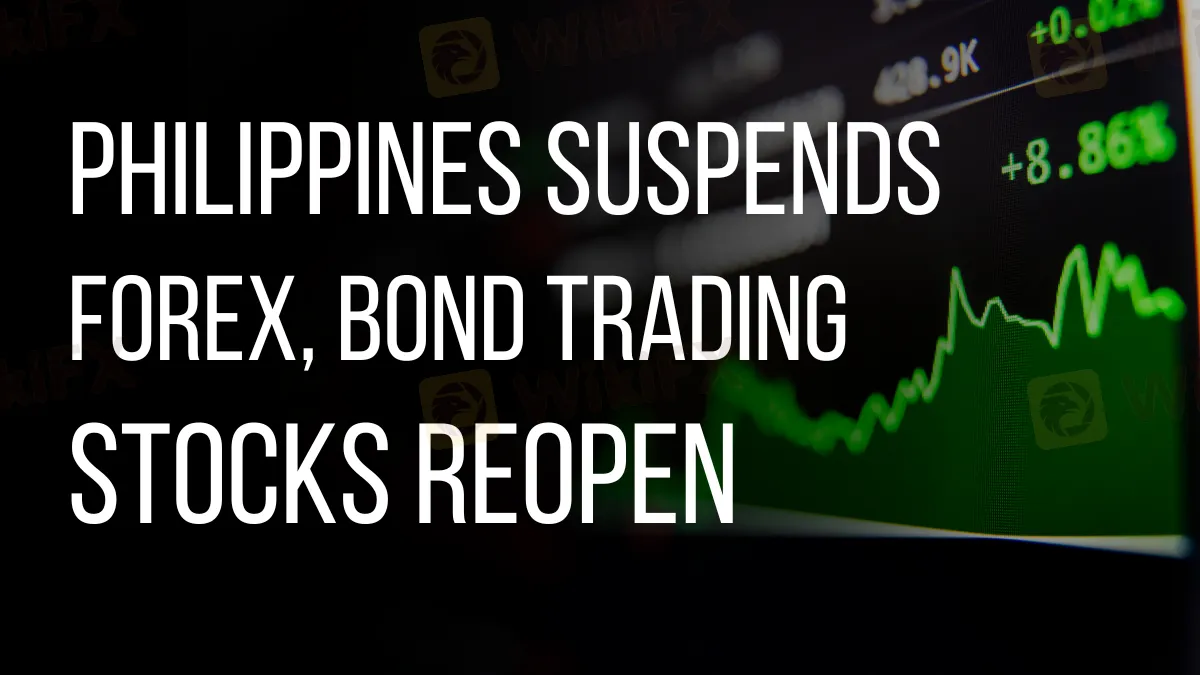简体中文
繁體中文
English
Pусский
日本語
ภาษาไทย
Tiếng Việt
Bahasa Indonesia
Español
हिन्दी
Filippiiniläinen
Français
Deutsch
Português
Türkçe
한국어
العربية
Philippines Suspends FX, Bond Trading; Stocks Reopen
Abstract:The Philippines halts FX and bond trading but reopens the stock market after Typhoon Gaemi's impact. Safety and mobility concerns influenced the decision.

The Philippines paused currency and fixed-income trading on Thursday due to Typhoon Gaemi, which just blew across the nation. However, the stock market has reopened for business, offering some normality among the interruptions.
The Bangko Sentral ng Pilipinas (BSP) issued the suspension, citing its most recent evaluation of the safety and mobility conditions. In a Facebook post, the central bank stressed the importance of protecting the well-being of market participants and the general public. The Philippine Dealing and Exchange Corporation endorsed this move by suspending fixed-income trading.
Despite the suspension of these markets, the Philippine Stock Exchange said in a post on X that equities market activity will resume on Thursday. This measure aims to stabilize financial operations and allow investors to manage their portfolios.
The decision comes after Manila halted government and educational operations on Thursday. Heavy monsoon rains created a landslide that displaced at least half a million people, illustrating Typhoon Gaemi's devastating effect. After wreaking havoc in the Philippines and Taiwan, the typhoon is now heading toward China.
The storm has wreaked havoc, causing extensive power outages in hundreds of thousands of homes, flooding streets, and at least five deaths. Authorities prioritize safety and recovery activities as the country tries to restore order in devastated regions.
You may access the daily news of the financial market here.

Disclaimer:
The views in this article only represent the author's personal views, and do not constitute investment advice on this platform. This platform does not guarantee the accuracy, completeness and timeliness of the information in the article, and will not be liable for any loss caused by the use of or reliance on the information in the article.
Read more

The Hidden Checklist: Five Unconventional Steps to Vet Your Broker
Forex broker scams continue to evolve, employing new tactics to appear credible and mislead unsuspecting traders. Identifying these fraudulent schemes requires vigilance and strategies beyond the usual advice. Here are five effective methods to help traders assess the legitimacy of a forex broker and avoid potential pitfalls.

Doo Financial Obtains Licenses in BVI and Cayman Islands
Doo Financial, a subsidiary of Singapore-based Doo Group, has expanded its regulatory footprint by securing new offshore licenses from the British Virgin Islands Financial Services Commission (BVI FSC) and the Cayman Islands Monetary Authority (CIMA).

CFI’s New Initiative Aims to Promote Transparency in Trading
A new programme has been launched by CFI to address the growing need for transparency and awareness in online trading. Named “Trading Transparency+: Empowering Awareness and Clarity in Trading,” the initiative seeks to combat misinformation and equip individuals with resources to evaluate whether trading aligns with their financial goals and circumstances.

Malaysian-Thai Fraud Syndicate Dismantled, Millions in Losses Reported
The Royal Malaysia Police (PDRM) has received 26 reports concerning the Nicshare and CommonApps investment schemes, both linked to a major fraudulent syndicate led by a Malaysian citizen. The syndicate’s activities came to light following the arrest of its leader by Thai authorities on 16 December.
WikiFX Broker
Latest News
ASIC Sues Binance Australia Derivatives for Misclassifying Retail Clients
WikiFX Review: Is FxPro Reliable?
Malaysian-Thai Fraud Syndicate Dismantled, Millions in Losses Reported
Trading frauds topped the list of scams in India- Report Reveals
YAMARKETS' Jingle Bells Christmas Offer!
AIMS Broker Review
The Hidden Checklist: Five Unconventional Steps to Vet Your Broker
WikiFX Review: Something You Need to Know About Markets4you
Revolut Leads UK Neobanks in the Digital Banking Revolution
Fusion Markets: Safe Choice or Scam to Avoid?
Currency Calculator


